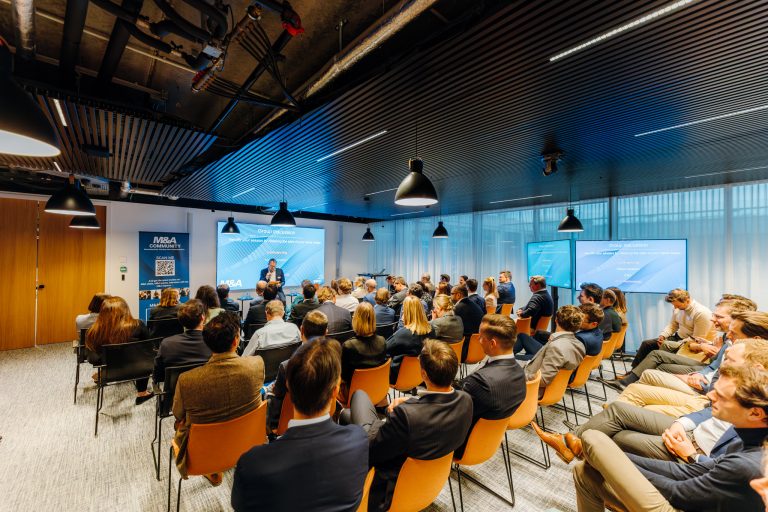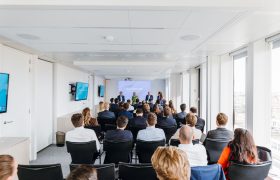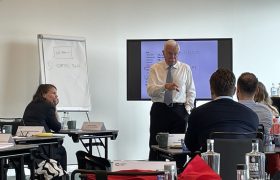“M&A is a human process, no matter what tools you use”

The M&A Forum kicked itself off with an opening debate, for which House of Executive had invited three top players in their field: Katrin Geyskens, managing partner of investment fund Capricorn Partners, Ruben Gofflo, M&A director at IT company Cegeka and Veronique Gillis, partner at PwC Belgium. Gofflo acknowledges: “We are indeed in a period of immense change, but the speed of change is also constantly increasing,” he says. “For some entrepreneurs this is paralyzing, for others it is not. I think companies that dare to take a leap now can take a huge lead over their competitors. Of course, this should not happen blindly, you do have to consider what is happening around you. Still, companies that have a culture that embraces change have an edge today.”

Companies that possess that culture (and can show resilience) are also highly valued in today’s M&A market, says Gofflo. “There are a lot of targets today, but instead of shooting at random, we are increasingly taking a proactive approach. We look for our own targets and talk to them: do you see a future for yourself together with Cegeka? We do this even before there is any intention to sell. And we do this in peace and quiet, without a hard sales process or constant deadlines.”
Endless due diligence
Katrin Geyskens looks at the problem mostly from a venture perspective, she says. “We invest mainly in young innovative companies and, when it’s time for an exit, indeed, you sometimes see a kind of paralysis among buyers today. There is interest, but the sales process is completely stretched, with endless due diligence. These kinds of companies are also very often sold on the dream, based more on future promises than on today’s figures. However, buyers often want hard evidence. Those future promises are not taken for granted.”
The sectors in which Capricorn itself invests (clean tech, digital health, …) offer a lot of opportunities to make big changes, according to Geyskens. “There is still a lot of innovation and entrepreneurship in the market, although valuations are becoming a bit more realistic again.”

Veronique Gillis points out that investors today like to see quality, but also take corporate culture and people into account. “The companies that can count on the most interest today show resilience, can deliver predictable EBITDA, have strong management and possess synergy potential. Companies that innovate very strongly and bet on cutting-edge technology also lie well in the market, for example in anything revolving around digitalization or the energy transition. Many companies going through a transformation are also trying to create value, for example by divesting certain departments through a carve out. This in turn brings opportunities for private equity or other investors. We have also seen many acquisitions in recent years, now it is time again to integrate and seek cost optimizations.”
AI versus humans
All speakers point to the huge importance that technology and innovation has in the market today. But does that also affect their own profession? And if so, how? “Oh yes, for example in terms of sourcing, AI can be a very big help”, says Gillis. “By identifying targets that could potentially be a match. That way, you go from a long list to a short list a lot faster and a lot more efficiently. It will also change our job. The role of the consultant will not go away any time soon, but by using data, we can work faster and add more value.”
Gofflo also sees the changes, but still emphasizes the artisanal nature of a deal. “M&A is a human process,” he says. “It always will be, no matter what tools you use. You can speed up the process, but the basis is that you are talking to humans: one human buys, another human sells. What AI can do today, is already amazing, for instance if you give the system financial information. But humans still remain in control. Which is not to say you shouldn’t embrace AI, because the efficiency gains are absolutely there.”

“Of course, the quality of AI very much depends on the quality of the data used,” Geyskens adds. “I sometimes wonder whether companies have a good overview of the data training their models. Ten years ago, you could take a shortcut, using some database you found online or got from a professor. Nowadays that won’t fly, we keep a very strict interpretation of things like GDPR, for example. I also think that AI will raise new questions and topics, about ethical AI for instance. Or about the reliability of the AI system.”
Due diligence and ESG
The panel also shed its light on ESG (Environmental, Social and Governance), a topic that has become completely unavoidable these days. How do they look at it: as a burden or as a goal? Geyskens says she welcomes it and explicitly wants to be part of that movement. “ESG impact investing has been in our DNA for years, but only now is it really coming to the surface, as part of due diligence for instance. When we want to make an investment, we also talk it through thoroughly with the management and that can be about a lot of different issues, from circularity over supply chain to diversity. I also feel that many entrepreneurs are open to it. Not in the least because, for example, redesigning your hardware or deploying a greener data center creates value. When we exit, everything has to be on point regarding ESG, otherwise the company will not be ready for the next phase.”

With due diligences zooming in deep into ESG, investors need to be knowledgeable about this too. “Guidelines are still needed for that,” says Geyskens. “How you exactly calculate your CO2 emissions may not be rocket science, but it has to be done. Totally new KPIs are also emerging like the extra number of quality years of life a medical product gives to a patient. It’s about a lot more than the number of employees coming to work by bike.”
Veronique Gillis points out the huge evolution ESG has undergone in recent years. “It used to be just a checklist, something you did to be compliant. Today, ESG has become part of the strategy. A question we often see in the market is: how can the company I want to acquire contribute to my ESG strategy? Or how can it help mitigate our own risk? In terms of financing, ESG has also become indispensable, certainly now that several banks base their financing criteria partly on ESG. That also makes some deals more difficult to finance.”
Finally, Gofflo sees that the interpretation of ESG can vary a lot depending on the industry. “In IT it’s typically about things like diversity,” he says. “It also plays a role in the war for talent. The young generation carries ESG close to their hearts. If you really endorse ESG and take it seriously, it has become a competitive advantage. As for ourselves, ESG is built into everything we do. In the short term, that can be detrimental, if you compare Europe with how things are done in, say, India. But in the long term, it will turn out in our favor.”
Low IPO activity
After the plenary session, the audience in attendance was divided into four smaller groups that could further discuss four diverse topics: ESG, AI, (re)financing and value creation.
In (re)financing, the group zoomed in on trends in financing and refinancing. The increasingly important role of debt funds and credit funds at the expense of banks was highlighted. We are evolving into a world in which banks will have to adapt to this new reality. Several attendees pointed out that Belgium is still an exception to this rule, although this situation could soon reverse in our country too.
In Belgium there is also still a lot of risk aversion, someone outlined the situation. High-tech companies, for example, are very difficult to finance through Belgian investors. And in Flanders it is often even more difficult than in Wallonia, where government investment funds are apparently willing to take on a bit more risk. Even when companies are in jeopardy.

As for the return of IPOs, most do not immediately see major changes in the coming years, the number of IPOs will remain relatively low. There is likely to be more activity in Amsterdam than in Brussels because there are many more SPACs and chip companies listed in the Netherlands. That supports the index and attracts liquidity. Brussels, in turn, is much better known for biotech and health tech companies, for example. Should these sectors become “hot” again at one time or another, then this will undoubtedly leverage Brussels.
Finally, the audience zoomed in on the evolution of interest rates. Nobody had a crystal ball with them, but when someone predicted two interest rate falls before the summer, there were quite a few approving murmurs. Whether that is wishful thinking remains to be seen.
Dressing up the bride
In the breakout session on value creation, there was a strong emphasis on the question: what is your core business and what is not? Which dovetailed nicely with the presentation on the carve-out strategy in the plenary session.

Many attendees also underlined the importance of cultural and strategic fit in the acquisition phase. If these are not there or not enough, continuing the process is likely to make little sense. Finally, it was also pointed out that salespeople need to prepare for a sale well in advance, to maximize value and make it as visible as possible. Dressing up the bride is absolutely not just an empty slogan.
The session on technology was, unsurprisingly, largely about artificial intelligence. AI brings with it a lot of potential for much deeper analysis and thus better decisions, everyone agreed. In the short term, it will bring strong efficiency gains and new ways of organizing the M&A process. The flip side of that coin: there was quite a bit of anxiety in this group about how AI is going to change their jobs or even make them redundant. How far will AI go? Nobody can predict that with certainty today.
The youngsters will save our world
In the ESG session, it became clear that ESG is slowly but surely starting to find its way into deal making, for example in the documentation requested from the seller and in due diligence. It is also clear that today the weight of the E (environment) is clearly heavier than that of the S (social) and the G (governance). Those two are likely to gain importance in the future, however.
Much also depends on the sector in which the deal takes place. Different sectors clearly have different mindsets. In services, for example, ESG is still a lot less important than in, say, industry. The size of the deal also plays a role: the bigger it is, the greater the importance of ESG.
Finally, all attendees also wholeheartedly agreed that the attention to ESG is particularly ingrained in young people. The youngsters will save our world. And with that reassuring thought it was time to hit the bar and do some networking.
The M&A Forum was hosted by the Platinum Partner of the M&A Community, PwC.
Take a look at the pictures here.








